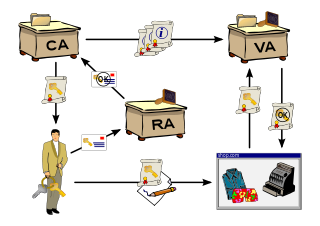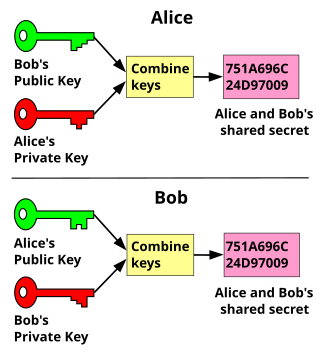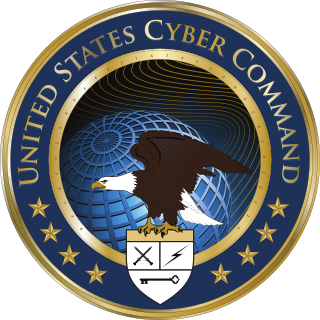Related Research Articles

Computer security, cybersecurity, digital security, or information technology security is the protection of computer systems and networks from attacks by malicious actors that may result in unauthorized information disclosure, theft of, or damage to hardware, software, or data, as well as from the disruption or misdirection of the services they provide.

The Defense Advanced Research Projects Agency (DARPA) is a research and development agency of the United States Department of Defense responsible for the development of emerging technologies for use by the military.

Government Communications Headquarters (GCHQ) is an intelligence and security organisation responsible for providing signals intelligence (SIGINT) and information assurance (IA) to the government and armed forces of the United Kingdom. Primarily based at "The Doughnut" in the suburbs of Cheltenham, GCHQ is the responsibility of the country's Secretary of State for Foreign and Commonwealth Affairs, but it is not a part of the Foreign Office and its Director ranks as a Permanent Secretary.

Public-key cryptography, or asymmetric cryptography, is the field of cryptographic systems that use pairs of related keys. Each key pair consists of a public key and a corresponding private key. Key pairs are generated with cryptographic algorithms based on mathematical problems termed one-way functions. Security of public-key cryptography depends on keeping the private key secret; the public key can be openly distributed without compromising security.
Information warfare (IW) is the battlespace use and management of information and communication technology (ICT) in pursuit of a competitive advantage over an opponent. It is different from cyberwarfare that attacks computers, software, and command control systems. Information warfare is the manipulation of information trusted by a target without the target's awareness so that the target will make decisions against their interest but in the interest of the one conducting information warfare. As a result, it is not clear when information warfare begins, ends, and how strong or destructive it is.

A public key infrastructure (PKI) is a set of roles, policies, hardware, software and procedures needed to create, manage, distribute, use, store and revoke digital certificates and manage public-key encryption.
In cryptography, X.509 is an International Telecommunication Union (ITU) standard defining the format of public key certificates. X.509 certificates are used in many Internet protocols, including TLS/SSL, which is the basis for HTTPS, the secure protocol for browsing the web. They are also used in offline applications, like electronic signatures.

Key exchange is a method in cryptography by which cryptographic keys are exchanged between two parties, allowing use of a cryptographic algorithm.
QinetiQ is a multinational defence technology company headquartered in Farnborough, Hampshire. It operates primarily in the defence, security and critical national infrastructure markets and run testing and evaluation capabilities for air, land, sea and target systems.

The Munich Security Conference is an annual conference on international security policy that has been held in Munich, Bavaria, Germany since 1963. Formerly named the Munich Conference on Security Policy, the motto is: Peace through Dialogue. It is the world's largest gathering of its kind.

The Transglobal Secure Collaboration Participation, Inc. (TSCP), which sponsors the Transglobal Secure Collaboration Program, was established in 2002 as a collaborative forum of organizations in the defense industry to address security issues with collaboration. TSCP is a government and industry partnership for secure electronic transmission and sharing of sensitive information internationally.
The Joint Worldwide Intelligence Communication System is the United States Department of Defense's secure intranet system that houses top secret and sensitive compartmented information. JWICS superseded the earlier DSNET2 and DSNET3, the Top Secret and SCI levels of the Defense Data Network based on ARPANET technology.
Proactive cyber defense, means acting in anticipation to oppose an attack through cyber and cognitive domains. Proactive cyber defense can be understood as options between offensive and defensive measures. It includes interdicting, disrupting or deterring an attack or a threat's preparation to attack, either pre-emptively or in self-defence.

DigiCert, Inc. is a digital security company headquartered in Lehi, Utah. DigiCert provides public key infrastructure (PKI) and validation required for issuing digital certificates or TLS/SSL certificates, acting as a certificate authority (CA) and trusted third party.

United States Cyber Command (USCYBERCOM) is one of the eleven unified combatant commands of the United States Department of Defense (DoD). It unifies the direction of cyberspace operations, strengthens DoD cyberspace capabilities, and integrates and bolsters DoD's cyber expertise which focus on securing cyberspace.
Cyberwarfare is the use of computer technology to disrupt the activities of a state or organization, especially the deliberate attacking of information systems for strategic or military purposes. As a major developed economy, the United States is highly dependent on the Internet and therefore greatly exposed to cyber attacks. At the same time, the United States has substantial capabilities in both defense and power projection thanks to comparatively advanced technology and a large military budget. Cyber warfare presents a growing threat to physical systems and infrastructures that are linked to the internet. Malicious hacking from domestic or foreign enemies remains a constant threat to the United States. In response to these growing threats, the United States has developed significant cyber capabilities.

The Defense Innovation Unit (DIU) is a United States Department of Defense (DoD) organization founded to help the U.S. military make faster use of emerging commercial technologies. Launched in 2015, the organization has been called "the Pentagon's Innovation Experiment". DIU is staffed by civilian and both active duty and reserve military personnel. The organization is headquartered in Mountain View, California — Silicon Valley — with offices in Austin, Boston, Chicago, and the Pentagon just outside Washington, D.C.
Corporate warfare is a form of information warfare in which attacks on companies by other companies take place. Such warfare may be part of economic warfare and cyberwarfare; but can involve espionage, 'dirty' PR tactics, or physical theft. The intention is largely to destabilise or sink the value of the opposing company for financial gain, or to steal trade secrets from them.
DarkMatter Group is a computer security company founded in the United Arab Emirates (UAE) in 2014 or 2015. The company has described itself as a purely defensive company, however in 2016, it became a contractor for Project Raven, to help the UAE surveil other governments, militants, and human rights activists. It has employed former U.S. intelligence operatives and graduates of the Israel Defense Force technology units.

National Cyber and Crypto Agency, is Indonesia's primary signal intelligence agency, as well as cyber intelligence, cyber threat intelligence, cyber defense, and cyber security agency.
References
- 1 2 3 "Economics Digital Identity" (PDF). The Economist. October 12, 2016. Retrieved 27 February 2017.
- 1 2 "America's Book Of Secrets - The Pentagon". The History Channel. October 12, 2016. Retrieved 27 February 2017.
- ↑ "Turning the cyber stalemate into action". The Colorado Springs Business Journal. 15 August 2013. Retrieved 27 February 2017.
- ↑ "America's Book of Secrets (TV Series):The Pentagon (2012) - Full Cast & Crew". IMDb . Retrieved 27 February 2017.
- ↑ "Honoring 24 of our teachers by selecting them to be included in the 2nd edition of "Lifting the Curtain: the disgrace we call urban high school education"". Lifting The Curtain of Education. 20 November 2014. Retrieved 27 February 2017.
- 1 2 "James Ryan". Cyber Security Summit. October 12, 2016. Retrieved 27 February 2017.
- ↑ "The Internet of Robotic Things: Secure, harmless helpers or vulnerable, vicious foes?". IT World (IDG). January 23, 2015. Retrieved 27 February 2017.
- ↑ "Realities of today's digital economy". Cyber Security Business. 7 October 2016. Retrieved 27 February 2017.
- ↑ "The Internet of Robotic Things: Secure, harmless helpers or vulnerable, vicious foes?". CSO. January 24, 2015. Retrieved 27 February 2017.
- ↑ "Robot security: Making sure machines don't become the latest big threat". ZDNet. October 12, 2016. Retrieved 27 February 2017.
- ↑ "Solving commercial cloud's security puzzle". C4ISRNET. 20 February 2015. Retrieved 27 February 2017.
- ↑ "Speakers – James Ryan". Robotics Alley. February 28, 2017. Retrieved 7 March 2017.
- ↑ "IoT Hope From Hacking Hearts". May 13, 2015. Retrieved 27 February 2017.
- ↑ "America's Book of Secrets: The Pentagon - Cast". IMDb. 2012. Retrieved 27 February 2017.